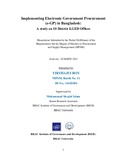Implementing electronic government procurement (e-GP) in Bangladesh: a study on 10 district LGED offices

View/
Date
2018-04-01Publisher
BRAC UniversityAuthor
Roy, TirthajitMetadata
Show full item recordAbstract
Government procurement in a developing country is often involved with collusive and corrupt
practices (Abdallah, 2015; cited in Naeem, 2016). In Bangladesh, the public procurement at
local level is also subject to pressure of local powerful personnel and political leaders where the
non-political tenderers are often forced not to participate in the tendering process (Abdallah,
2015). The management of public procurement through the application of information
technology, called e-GP can address this malpractice. Further, the e-GP promotes competition
through participation of local as well as region bidders and government purchases are processed
in more efficient, transparent and accountable manner. According to a World Bank study, the e-
GP could save more than 15 per cent of the government's procurement costs (Mahmood, 2013).
Grounded on these benefits, e-GP was introduced in the Local Government Engineering
Department (LGED) in 2010-11 under the auspices of the Second Public Procurement Reform
Project (PPRP II). The overall purpose of this study is to assess the implementation of e-GP in
selected LGED offices, identify the challenges of implementing e-GP in various stages of
procurement cycle in LGED and find out the measures to overcome those challenges. Since most
of LGED’s procurements are done by the offices of District Executive Engineers of LGED, 10
such offices are randomly selected for data collection. A questionnaire survey has been
administered among the officials of these offices. Survey data have been presented using
statistical tools and with descriptions. Prior to presentation of anecdotal evidence from survey,
the secondary information has been summarized which were collected from various documents
and statistics published by LGED, CPTU and other organizations. This study identified key
challenges for implementing e-GP in various stages of procurement cycle in district LGED
offices and put forward the doable solutions to address those challenges.
